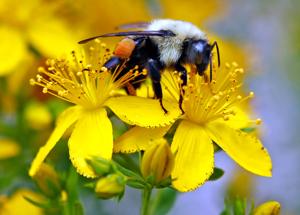Mills signs bill banning bee-killing pesticide in Maine

(The Center Square) – Maine Gov. Janet Mills has approved a ‘first-in-the-nation’ ban on certain residential uses of an insecticide blamed for destroying bee populations.
Under the measure signed by Mills, the state Department of Agriculture, Conservation and Forestry will prohibit the use of four neonicotinoids in lawn care, turf and other residential pest control applications. The restrictions won’t affect agricultural crops or other uses of neonicotinoids, such as treating wood, pet care or controlling indoor insects.
The bill’s main sponsor, Rep. Nicole Grohoski, D-Ellsworth, said its passage shows that Mainers are “leaders in protecting and preserving our environment, including our pollinator populations.”
Environmental groups also praised the decision, saying it will mean stronger protections for the state’s endangered honeybees.
“There is no justification for using these pesticides for cosmetic purposes in our residential areas; a prettier lawn or rose garden isn’t worth the damage done,” Anya Fetcher, state director of Environment Maine, said in a statement. “We want to ensure that today, tomorrow and the next day, Maine’s meadows and gardens continue to buzz with the sound of bees.”
Maine’s wild bee population is declining, according to environmental groups, which say the state lost more than 40% of its honeybee colonies in the previous winter.
While a number of factors contribute to colony losses, scientists say there is increasing evidence that neonicotinoids and other pesticides are a deadly contributing factor.
“Neonicotinoid pesticides are neurotoxins designed to kill insects,” Sean Mahoney, executive director of the Conservation Law Foundation of Maine, said in recent testimony. “It is therefore no surprise that they are tremendously toxic to honeybees, wild bees, and many other invertebrates.”
A teaspoon of the toxic compound is enough to kill more than 1 billion honeybees, according to the environmental group.
Maine’s restrictions would go further than other states that have restricted retail sales of neonicotinoid-based pesticides by preventing landscapers, pest control companies and other commercial businesses from using the products.
The measure faced pushback from the agrochemical industry, which argues that a ban isn’t necessary and would circumvent a “robust regulatory process” that ensures the products are safe for commercial and residential use.
Riley Titus, a lobbyist for the trade group CropLife America, said neonicotinoid-based pesticides “protect a wide variety of crops, including apples, potatoes, corn and other fruits and vegetables, from damaging and invasive pest pressures.” He said banning its use for lawn care and other residential applications could also impact agricultural pest control.
“Neonicotinoids represent one of the most significant advancements in insecticide technology in recent history and are among the safest pesticides for people and the environment,” Titus said in recent testimony.
Landscapers warned that prohibiting use of the pesticide would result in tree loss and other environmental impacts.
The U.S. Environmental Protection Agency is currently studying whether to classify several neonicotinoids as toxins and restrict its use for crops and pest control.
Disclaimer: This content is distributed by The Center Square


